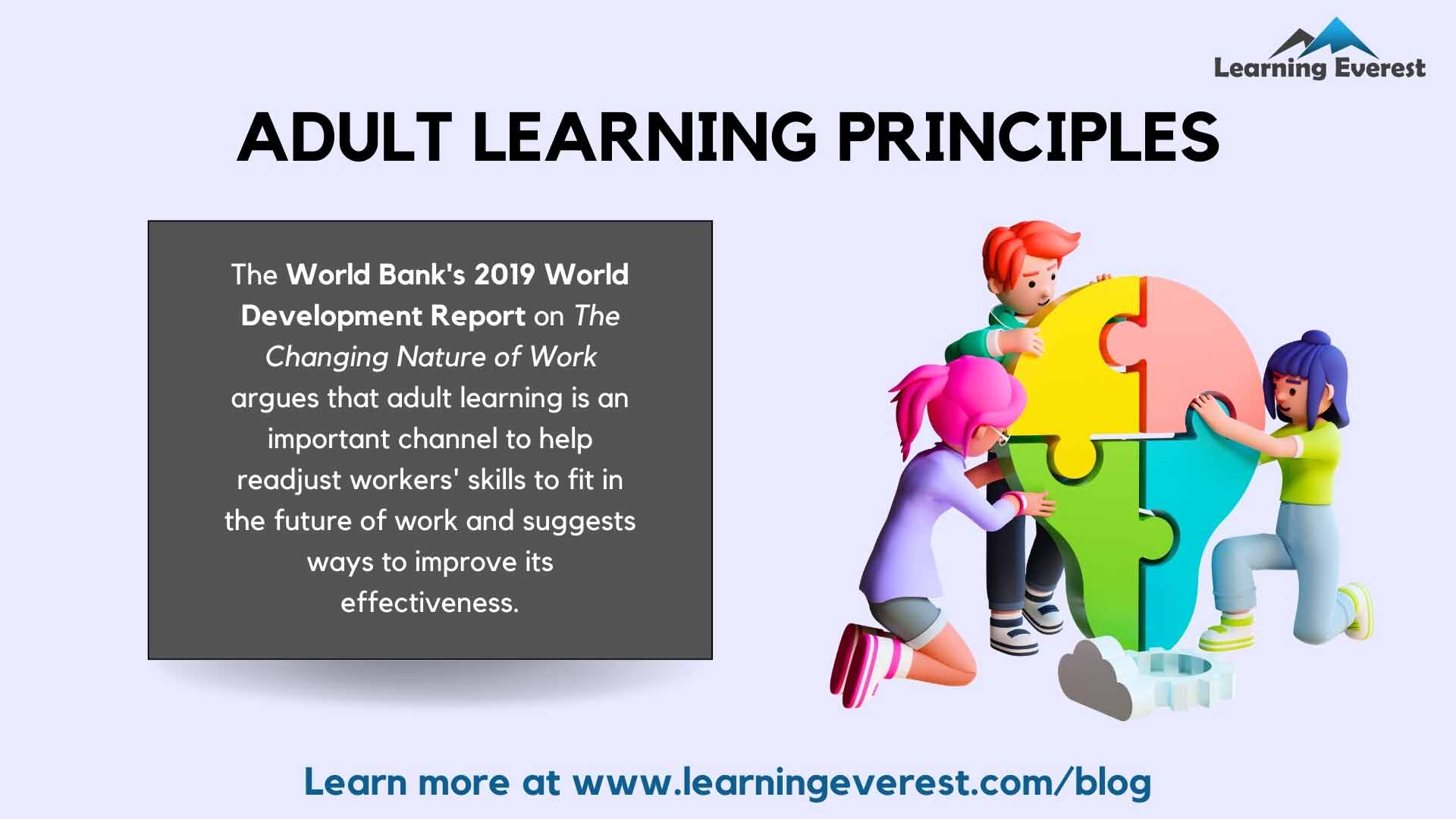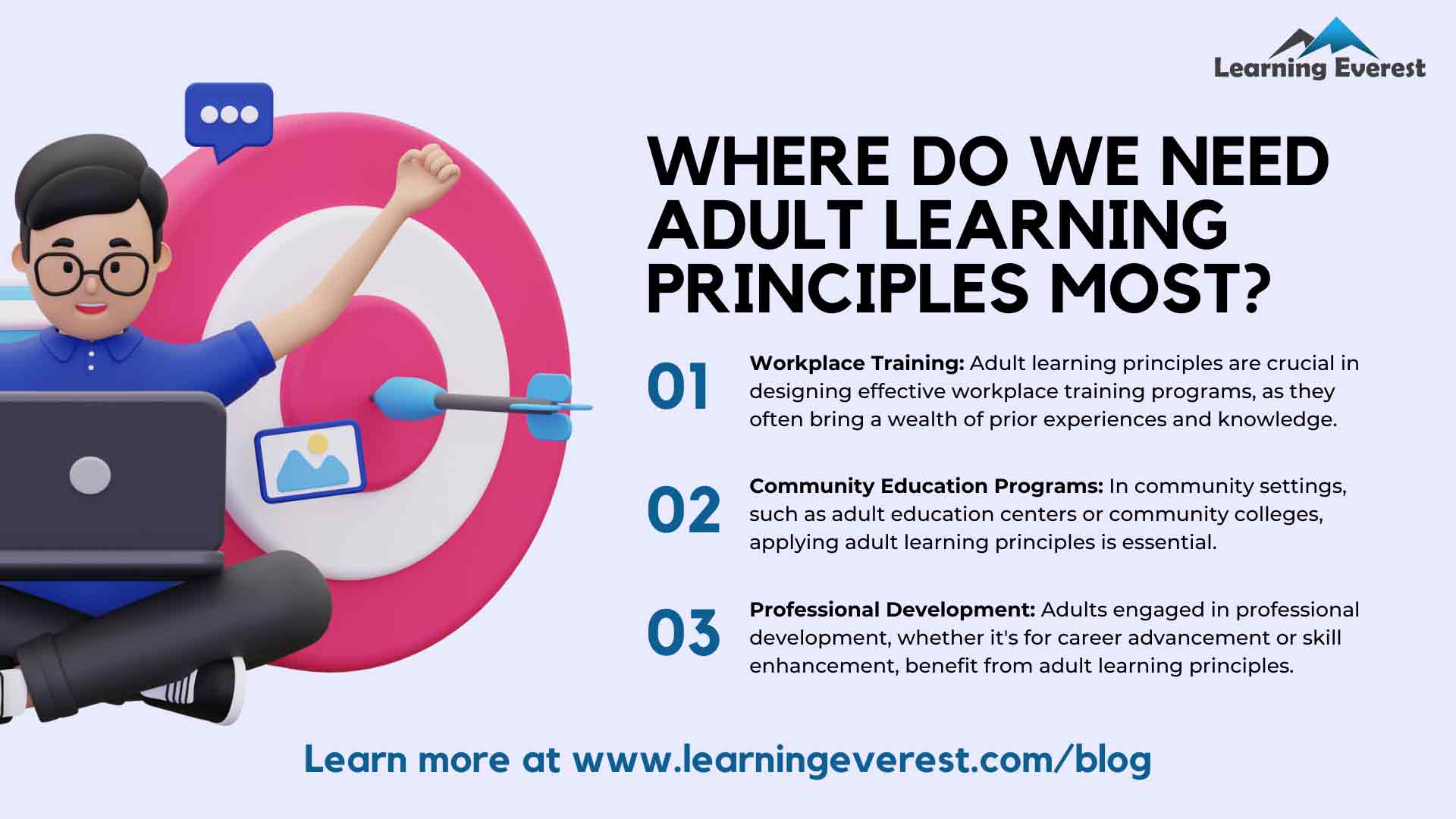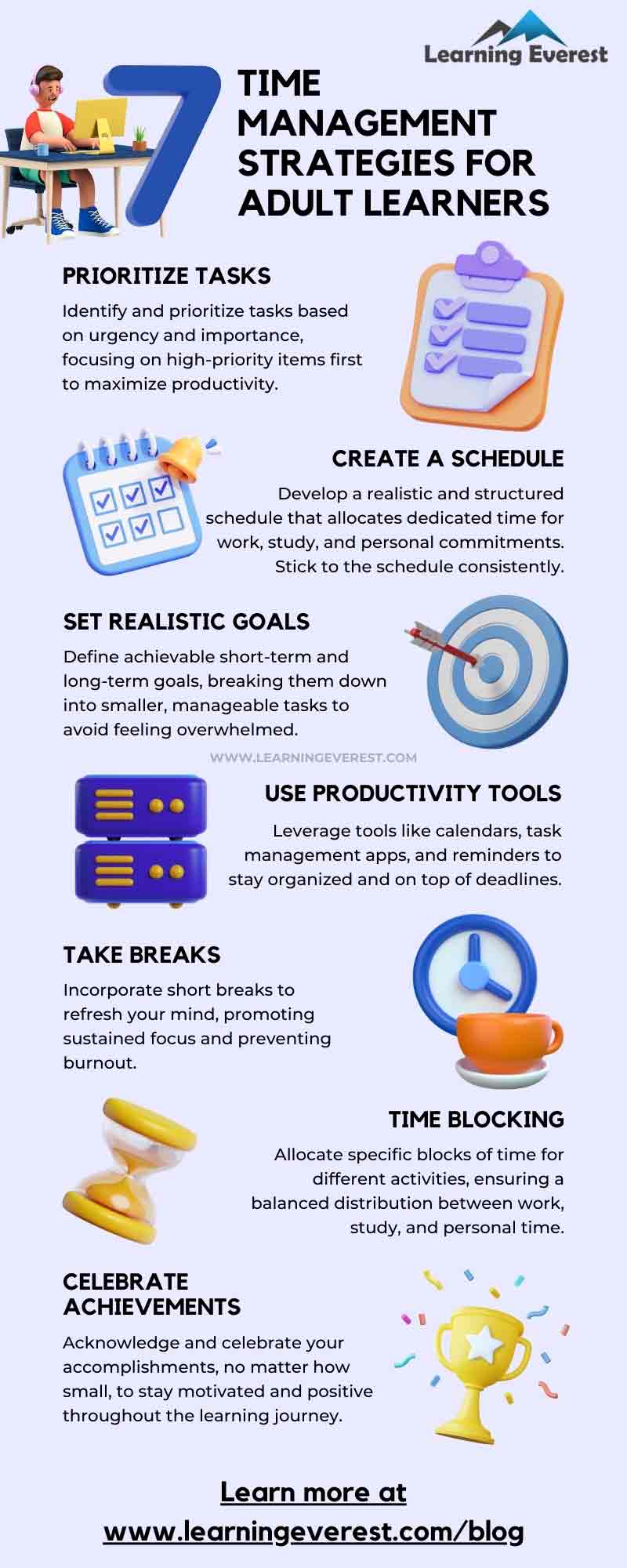Malcolm Knowles’ adult learning principles provide a solid framework for designing effective and impactful educational experiences for adult learners. Instructional designers can create transformative learning environments by recognizing their self-directed nature, leveraging their experiences, understanding their readiness to learn, incorporating problem-solving approaches, and facilitating immediate learning applications.
Applying these principles offers a blueprint for success in adult education and equips learners with the knowledge and skills necessary to thrive in their personal and professional lives. By embracing Knowles’ principles, we can unlock the full potential of adult learners and foster a lifelong love for learning. This blog post will dive deep into Malcolm Knowles’ adult learning principles and explore how they serve as a blueprint for success in facilitating adult learning.
What is Adult Learning?
Developed by Malcolm Knowles, Adult Learning Theory, or Andragogy, is a theory based on a self-directed, independent learning method for adults. While some ideas of pedagogy may spill over into training and development, andragogy, or the theory and practice of educating adults, is of more significant importance to organizations and training and development professionals. The workplace includes adults primarily, so adult learning must be at the center of training and development activities. Adult learners are driven by intrinsic motivators to achieve autonomy, mastery, and purpose and are more likely to be active participants, rather than passive participants, in learning. There are some principles when it comes to andragogy:
- Adults must understand why learning is essential.
- Adults must expand on their prior knowledge.
- Adults must feel in charge of their education.
- Adults prefer problem-focused instruction. Therefore, adult learning ought to be more problem-focused than content-focused.
- Adults should be in charge of making decisions about their education since they are involved in planning and evaluating their instruction.
Therefore, supporting the requirements of adult learners can be achieved only by incorporating andragogy into learning courses.

Adult Learning Principles
Malcolm Knowles’ Adult Learning Principles
Critical aspects of an adult learning program are to look for include a focus on teaching specialized skills that can be put into practice in the workplace and content that can easily be understood by learners. Educators, trainers, and instructional designers can create engaging and impactful learning experiences for adult learners by understanding and applying these adult learning principles.
Let’s discuss this in detail.
1. Principle of Self-Directed Learning
One of the fundamental principles put forth by Knowles is the concept of self-directed learning. Unlike children, adult learners are driven by internal motivations and their own personal goals. They prefer taking ownership of their learning journey and seeking relevance in the content they engage with.
2. Experience as a Learning Resource
Knowles emphasized the value of utilizing learners’ experiences as a valuable resource for learning. Adult learners come with a wealth of knowledge and life experiences, which can be harnessed to enhance learning.
3. Readiness to Learn
Understanding the readiness to learn is crucial when designing adult education programs. Adult learners are motivated to learn when they perceive a direct relevance to their personal or professional lives.
4. Problem-Centered Approach
Adult learners are problem-solvers by nature. Knowles advocated for a problem-centered approach that integrates real-world challenges into the learning process. We will examine the benefits of adopting a problem-centered approach and explore how it promotes critical thinking, collaboration, and practical application of knowledge.
5. Immediate Application of Learning
Adult learners are motivated by the opportunity to apply newly acquired knowledge immediately. Knowles emphasized the importance of designing learning experiences that allow for immediate application and practice. By enabling learners to bridge the gap between theory and practice, we can enhance their learning outcomes and overall satisfaction.

Where Do We Need Adult Learning Principles Most?
What are the advantages of adult learning in the workplace?
Embracing adult learning in the workplace is a strategic move that brings numerous benefits to both employees and organizations. The advantages of ongoing education are undeniable, from enhanced adaptability and increased employee engagement to improved performance and a culture of innovation. By investing in adult learning programs, organizations can foster a skilled and motivated workforce, driving growth, success, and sustainable competitive advantage in today’s ever-evolving business landscape.
- Provides Continuous Learning: Adult learning equips employees with the necessary tools and knowledge to embrace change and navigate new technologies, methodologies, and market trends. Employees can develop the agility needed to thrive in a rapidly evolving workplace by embracing continuous learning. This adaptability enables individuals to take on new roles, contribute to diverse projects, and readily adjust to shifting business priorities.
- Boosts Engagement: When organizations invest in adult learning programs, they send a powerful message to their employees: “We value your growth and development.” This fosters a sense of loyalty and engagement. Employees with access to learning opportunities are more likely to feel motivated and satisfied in their roles.
- Fosters Well-Trained Workforce: A well-trained and knowledgeable workforce is more likely to perform at a high level. Adult learning equips employees with the skills, expertise, and up-to-date knowledge needed to excel in their roles. By investing in continuous education, employers can positively impact productivity and performance. Whether acquiring new technical skills, developing leadership abilities, or refining critical thinking, adult learning programs provide individuals with the tools they need to perform their tasks efficiently and effectively.
- Fosters Workplace Culture: Adult learning stimulates innovative thinking and fosters a culture of creativity within the workplace. Employees who engage in continuous learning expand their knowledge base and gain exposure to different perspectives, methodologies, and problem-solving approaches. This newfound knowledge and diverse thinking can lead to innovative solutions, improved processes, and fresh ideas. By encouraging employees to seek out new learning opportunities, organizations can foster a culture of innovation and drive continuous improvement.
- Follows Market Trends: The pace of technological advancements and industry disruptions necessitates the continuous upskilling and reskilling of the workforce. Adult learning allows employees to stay relevant and adaptable in an ever-changing job market. By investing in their employees’ ongoing development, organizations can future-proof their workforce, ensuring they have the skills and expertise required to navigate emerging technologies, industry shifts, and new challenges. This commitment to continuous learning also positions the organization as an attractive employer, attracting top talent who value professional growth opportunities.
Lastly, an active mind is a healthier mind. Keeping the mind active and training the brain matter to keep it working is compared, by some scientists, to being like exercising your physical body by doing regular yoga.
Infographic

7 Time Management strategies for adult learners
Was this article helpful?
The following articles can also be a helpful guide as you get started:
Andragogy – Adult Learning Theory
Adult Learning Theory and its Unique Challenges in E-Learning
Or, talk to us to create engaging and innovative eLearning modules for adult learners. BOOK A DEMO TODAY!
Knowledge Check!
Frequently Asked Questions (FAQs)
1. What is adult learning?
Developed by Malcolm Knowles, Adult Learning Theory, or Andragogy, is a theory based on a self-directed, independent learning method for adults.
2. How do you think pedagogy and andragogy are related to each other?
Pedagogy is a child-focused teaching approach, whereas andragogy is an adult-focused learning approach.






Informative article on Malcolm Knowles’ adult learning principles! Your blog beautifully outlines key insights into adult education, emphasizing learner-centric approaches. It’s enlightening to understand the principles that shape effective learning for adults. Thanks for sharing valuable knowledge in the realm of adult education!